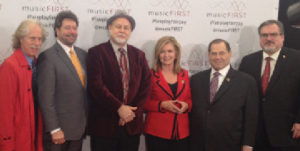AFM Adopts Strong Stance to Protect Agreements
Tired of watching record labels and film companies blatantly disregard conditions of their AFM agreements, the Federation took decisive action on a number of fronts in 2015. In May, the AFM filed a lawsuit against Warner Bros., Paramount, and MGM for violating their master contracts by recording film scores outside the US and Canada. Then, in June, the AFM sued Paramount Pictures, Inc. for recording the score to the film Same Kind of Different As Me in Slovakia.
July saw the AFM file a lawsuit against Sony Music Entertainment, Inc. for violations of the Sound Recording Labor Agreement (SRLA). Finally, in August, the Federation filed suit against several record companies over digital music distribution revenue and failure to make pension fund contributions.
“It’s an unprecedented amount of court enforcement action filed by our union, and it’s been a long time coming,” said AFM President Ray Hair in his July 2015 column. “Despite our attempts to negotiate for them, there are no grievance and arbitration provisions in our contracts with the film and TV producers, or the record companies, making the courts our port of last resort.”
AFM Negotiates New Agreements 
As the year began, AFM President Ray Hair announced that the Federation had concluded negotiations for both a successor Integrated Media Agreement (IMA) in late December 2014 and a successor Motion Picture and Television Film Agreement in early January 2015. His March column included details of the negotiations, as well as highlights of the new agreements.

(L to R): AFM Local 802 (New York City) Member “Blue” Lou Marini; AFM President Ray Hair; AFM International Executive Board Member (IEB) and Local 257 (Nashville, TN) President David Pomeroy; US Representatives Marsha Blackburn (R-TN) and Jerrold Nadler (D-NY); and IEB Member and Local 802 President Tino Gagliardi.
At the end of March, negotiations began for successor agreements covering musicians who perform live and prerecorded variety shows on basic and premium cable television. In July, Hair announced that progressive new agreements with the producers of Conan, as well as with Viacom for Country Music Television (CMT) content.
Formal negotiations with the major labels for a successor Sound Recording Labor Agreement (SRLA) began at the end of September. The previous SRLA expired February 2015. Then, October brought the opening round of talks with the public television industry toward a successor National Public Television (NPTV) Agreement. The previous agreement expired in December 2005, but both parties have continued to observe its terms.
Busy Year for Political & Legislative Office
As the year began, AFM Legislative-Political Director Alfonso Pollard reported on the “Cromnibus” government spending package and its effect on the arts. He also announced the details of long-awaited Department of Transportation (DOT) rules regarding carriage of musical instruments onboard US airlines. Effective March 6, the agreement follows nearly three years of negotiations and lobbying between music stakeholders (represented by the AFM) and DOT officials.

(L to R) NEA Chair Jane Chu, AFM President Ray Hair, AFM Legislative Director Alfonso Pollard, and NEA Music & Opera Director Ann Meier Baker at NEA headquarters in Washington, DC.
Throughout the year, a series of tools were developed to help members navigate both the new carriage regulations and US Fish and Wildlife Service rules regarding travel with instruments containing protected species. The handy Guide to Flying with Musical Instruments, can be downloaded from the website: http://www.afm.org/departments/legislative-office/instruments-as-carry-on.
In April, Representatives Jerrold Nadler (D-NY) and Marsha Blackburn (R-TN) introduced a new performance rights bill, the Fair Play Fair Pay Act of 2015. The US is the only industrialized nation that does not have a performance right for sound recordings broadcast over terrestrial radio. Members and others can show their support for this important legislation by logging onto: musicfirstcoalition.org/take_action.
Ray Hair testified before the Copyright Royalty Board in Washington, DC, in April, in an effort to promote increased payments to musicians from digital webcasters like Pandora. In his May column, he denounced a recent deal between Pandora and leading classical music label Naxos that bypasses direct payment of performance rights royalties for digital radio through SoundExchange and via the AFM and SAG-AFTRA Fund. The multi-year license covers the entire Naxos catalog, including many US orchestras.
Again this year, the AFM was a co-sponsor of Arts Advocacy Day, which is a week of arts advocacy activities held each spring in Washington, DC. Among topics of focus were: support for arts and arts education funding; tax reform to encourage charitable arts giving; cultural exchange programs and improved visa processing; protecting wireless technology for arts; and net neutrality.
In an effort to stem the tide of offshoring sound scoring jobs, AFM Local 47 (Los Angeles, CA) and the AFM Legislative-Political Office worked with members of Congress to reform legislation focused on the film industry and creating new state tax credit legislation designed to close loopholes in current laws.
Organizing and Building Industry Ties
In what could be a model for other cities across the US, the Fair Trade Music Seattle (FTMS) organizing campaign of Local 76-493 (Seattle, WA) gained momentum in 2015. Many area musicians were signed on and more than 20 Seattle venues agreed to its pledge. Two primary areas of focus for FTMS in 2015 were teaching musicians how to get effective performance agreements and ensuring adequate sound in clubs. May 20, 2015 was declared Fair Trade Music Day in the city.

Fair Trade Music Seattle (FTMS) activist and Local 76-493 (Seattle, WA) board member Marc Smason performs at FTMS venue Pies & Pints.
In February, AFM/CFM representatives attended the Folk Alliance International (FAI) Conference in Kansas City, Missouri. Alfonso Pollard spoke on a panel about new US airline policies and laws. CFM Executive Director Liana White participated in a panel on crossing the border with temporary work permits. Many members from Local 1000 (Nongeographic) and other Canadian and US locals attended.
In August, Pollard and Ray Hair visited Washington, DC, to strengthen ties with federal arts leaders. They visited both NEA Chair Jane Chu and John Edward Hasse, curator of American Music at the Smithsonian Museum.
Many Orchestras Show Financial Improvements in 2015
The improving national economy saw quite a few orchestras allowing small annual salary increases, filling long-vacant positions, and expanding their seasons. While some orchestras are still struggling to negotiate fair agreements, many are showing positive signs.

Download the Guide to Flying with Musical Instruments PDF at: afm.org/departments/legislative-office/instruments-as-carry-on.
As the new year began, The Cleveland Orchestra, Detroit Symphony Orchestra, Indianapolis Symphony Orchestra, Buffalo Philharmonic Orchestra, and Cincinnati Symphony Orchestra reported closing fiscal year 2014 in the black. Minnesota Orchestra ended FY2014 with a small deficit, but announced a balanced budget for fiscal year 2015, ending August 31.
While still operating at a loss, the Nashville Symphony Orchestra’s FY 2014 audit showed improvements for the second year in a row. It projects an end to its operating deficit within two years. The Atlanta Symphony Orchestra ended its 2014-2015 season in the black for the first time in 11 years.
Many orchestras signed contracts that contained at least small increases, among them: Jacksonville Symphony Orchestra (effective through 2016/2017 season with partial restoration of previous 11% salary cuts); San Francisco Symphony (base salary and pension benefit increases); Symphony Nova Scotia (five-year agreement with season expanded from 33 to 35 weeks); Stockton Symphony Association (three-year contract with three-tier pay increase); Cincinnati Symphony Orchestra (five-year agreement with 1.5% salary gains yearly and restored 14 of 23 permanent vacancies); Minnesota Orchestra (3.5-year agreement with 8.1% salary increase over its life, plus 87 full-time musicians by final year); Phoenix Symphony (one-year agreement with a 3.75% increase in base-scale wages); Utah Symphony | Utah Opera (three-year contract with an average 3.5% increase in base salary); San Antonio Symphony (two-year contract with increases in season length and salary, if fundraising goals are met); Chicago Symphony Orchestra (three-year contract with wage and pension increases); Saint Paul Chamber Orchestra (two-year contract with small increases that narrow the pay gap between section and titled players); and The Philadelphia Orchestra (one-year agreement with 3% raise and increase orchestra complement by one).
Among the worrisome situations, Binghamton Philharmonic’s new two-year contract includes a wage freeze and reduction in mileage reimbursements. While the new Columbus Symphony Orchestra contract maintains its 26-week season, it imposes a wage freeze. Grand Rapids Symphony musicians struggle for a fair contract that makes up for drastic pay cuts they accepted in 2009. The American Symphony Orchestra (ASO) announced less concert offerings for the 2015-2016 season to save money. In September, musicians, supporters, and AFM leadership rallied for Hartford Symphony musicians whose management is proposing 40% wage reductions. Fort Worth Symphony Orchestra is also struggling for a fair contract.
Sadly, Orchestra London in Ontario ceased operations and filed for bankruptsy during its 2014-2015 season due to a large deficit. Its musicians continued to perform sold-out concerts for the community. Green Bay Symphony Orchestra, facing a $55,000 deficit, shut down in April.
Canadian Unions Struggle Under Conservatives
At the start of the year, AFM Vice President from Canada Alan Willaert described the new Canadian Conference Standards Committee. It is chartered with helping locals with items such as the training of new officers, use of AFM freelance co-funding, securing agreements for cable television performances, and reworking contracts.
In March, Willaert announced that the General Production Agreement between the CFM and the CBC had been overwhelmingly ratified.
In May, the copyright on sound recordings in Canada was extended from 50 years after release to 70 years. However, the change did not include authors and publishers, where copyright protects a song for the life of the author plus 50 years.
In August, the Organization of Canadian Symphony Musicians (OCSM) celebrated its 40th annual conference at a “unity conference” held alongside the AFM Canadian Conference in Windsor, Ontario.
Bill C-377, which imposes unprecedented reporting standards upon labour organizations, moved forward thanks to Canada’s conservative-controlled Stephen Harper government. Meanwhile, Canadian unions challenged bill C-59 saying it violates collective bargaining rights by giving employers “unilateral authority” when it comes to sick leave, regardless of existing collective agreements.
On the political front, Canada’s Harper government proved a continued challenge for unions across the country for much of 2015. The decisive victory by Justin Trudeau and the Liberals in October should bring some relief. Trudeau says he will keep his election promise to rescind union transparency/oversight Bills 377 and 525, which comprise “right to work” type legislation passed through Senate by the previous government.
Other AFM News in 2015
This spring Ray Hair announced that the 100th AFM Convention will take place June 2016 at the Westgate Las Vegas Resort and Casino. Meanwhile, the Federation extended its lease agreement to allow its headquarters to remain in Times Square, New York City, through January 2019 with minimal annual rent increases. This will provide the AFM time to build up money in its reserves for eventual relocation.

(L to R) MPTF Trustee Dan Beck, Rosanne Cash (member of Local 802), CEO of University Settlement Michael Zisser, and AFM Secretary-Treasurer Sam Folio at the MusicianFest kickoff.
The scoring of Star Wars Episode VII took place in Los Angeles over the summer, under an AFM contract. This was considered a major “win” for LA studio musicians. Previous installments of the franchise were scored in London. The recording would generate $2 million in wages, benefits, and production spending.
The Music Performance Trust Fund (MPTF) wrapped up its 67th fiscal year April 30, having co-sponsored more than 2,777 performances. It began its fresh fiscal year with the launch of a new program: MusicianFest. With help from the Film Fund Trust Fund, MusicianFest provided free live music performances at senior centers across the US and in Canada. In the US, the programs were offered through a partnership with the National Council on Aging (NCOA) and in Canada through the Health Arts Society of Canada. All performances were completed by the end of June. MPTF hopes to continue and expand the program for next year.
The Trans-Pacific Partnership (TPP) trade agreement was reached October 5, and November 5 President Obama sent a letter to Congress of his intent to enter into the TPP. Numerous US union leaders continue to speak out against the pact itself for weak labor protections, as well as the secretive way in which it was negotiated. The Canadian labor movement is also vehemently opposed.



